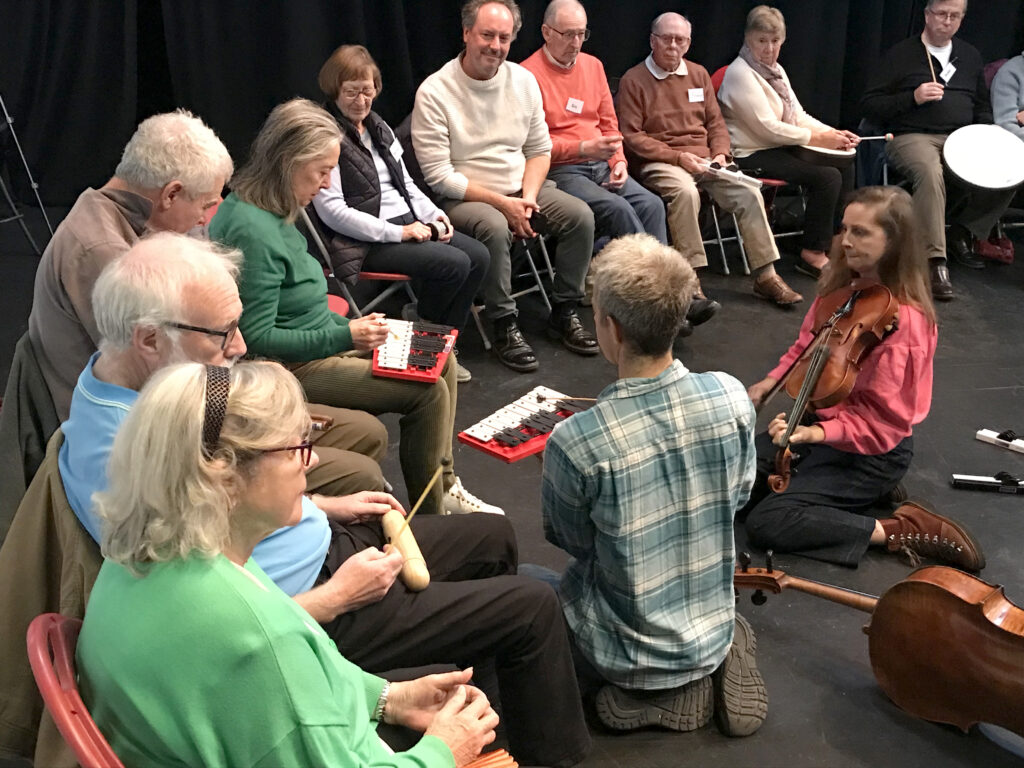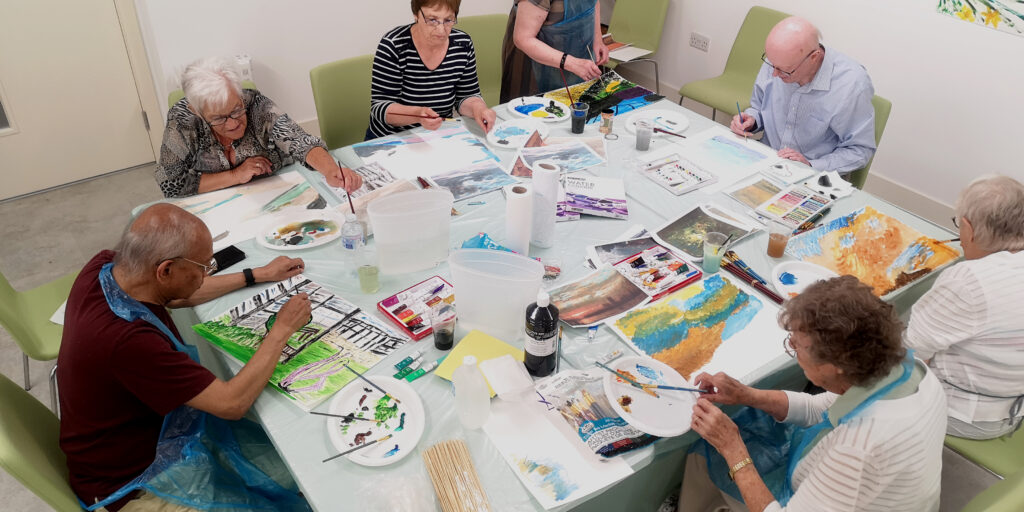
Who We Support
We seek to unlock the artistic talents of thousands of people, using arts as a tool for social mobility and inclusion – focussing our efforts on communities with genuine need.

We specialise in working with people at all stages of dementia, disabled and learning disabled people, people with mental health concerns and socially isolated people, particularly due to caring responsibilities or old age.
Age Exchange was founded with the belief that people with dementia have valuable contributions to make to society. Our work continues to honour this vision by creating environments where their voices are heard and their lives are enriched through creative expression.
Reminiscence Arts is at the heart of our work with people living with dementia. We use a variety of artistic mediums – such as visual arts, music, and drama – to help individuals share their memories and experiences. This approach not only stimulates minds but also fosters meaningful interactions, allowing people to rediscover their voice and regain confidence.
Central to our practice is the RADIQL model, an evidence-based and academically validated framework developed to provide the most person-centred care. RADIQL integrates multiple artistic methods to tailor support to each individual’s unique needs, ensuring that our interventions are as impactful and personal as possible.
Our programmes have a profound effect on the quality of life for people with dementia. By focusing on their strengths and interests, we help build their self-esteem and create opportunities for joy and connection. This approach not only enriches their daily lives but also promotes a sense of purpose and wellbeing.
We recognise that dementia affects not just the individuals but also their families and carers. Our services extend to support these vital caregivers, offering them resources and tools to better understand and connect with their loved ones. We also provide a space for carers to find respite, gain new insights and build a supportive community.
We provide tailored programmes for individuals with Young Onset Dementia, a condition that affects people under the age of 65. Our approach is designed to address the unique challenges and needs of younger individuals living with dementia, helping them lead fulfilling and connected lives.
Young Onset Dementia presents specific challenges. People with Young Onset Dementia often face significant life changes, such as career shifts and altered family roles, and they may also encounter social isolation due to their relatively young age.
Our programmes are designed to foster connections and create supportive communities. We provide opportunities for individuals to engage with others who share similar experiences, helping them build relationships and reduce social isolation. But by focusing on people’s unique strengths and passions, we help them maintain a sense of identity and purpose, despite the challenges they face.
We also offer support for families and carers of those with Young Onset Dementia, including resources and guidance to help them navigate the challenges of this condition. We provide a space for carers to share their experiences, find respite and gain new perspectives on supporting their loved ones.
Our innovative, arts-based approach empowers individuals with Learning Disabilities, Autism Spectrum Disorder (ASD), Acquired Brain Injuries (ABI) and other related conditions, offering new pathways to independence and personal growth.
We believe in the power of art to help everyone express their unique experiences and perspectives. Through various artistic mediums, we provide a platform for individuals to communicate their worlds, whether they are verbal or nonverbal. Our approach ensures that each person has the opportunity to share their thoughts and emotions in a way that feels right for them.
Our model focuses on building connections based on personal interests rather than just shared conditions. By exploring individual passions and talents, we help participants connect with others who share similar interests or experiences, fostering a sense of belonging and mutual support.
We use arts-based learning as a gateway to developing skills and confidence that lead to greater independence. Our creative activities are designed to help participants build essential life skills, explore voluntary or career interests and gain the self-assurance needed to pursue their goals.
Our approach also benefits family members and carers by offering new insights into their loved one’s experiences and progress. Creative outputs, such as artwork and performances, provide unique perspectives and help strengthen relationships, supporting the overall independence or recovery journey.
At Age Exchange, we harness the power of creativity to transform lives. Our innovative, arts-based approach shifts the focus from clinical care to creative engagement, addressing mental health challenges in a sensitive and empowering way.
We support individuals with complex mental health needs, including those who have experienced trauma, psychosis or addiction. Our programmes help them rebuild their lives, not just recover, by fostering connections based on personal history, culture and passions.
Our Integrated Arts-Based Mental Health Recovery Model creates communities of shared interests, offering meaningful engagement that extends beyond clinical settings. Family and friends also benefit, finding reassurance, understanding, and new ways to connect with their loved ones.
We support a wide range of mental health conditions, including schizophrenia, depression, PTSD and anxiety. Our work empowers individuals to move beyond their diagnosis and build fulfilling, sustainable lives.
At Age Exchange, we recognise the invaluable role of family carers in supporting their loved ones through various life challenges. We believe in the power of creativity to support mental and emotional wellbeing. Our creative workshops are designed not only for those we support but also for their carers. By participating in artistic activities, carers can explore their own interests, find new outlets for expression, and build a sense of community.
Family carers often juggle multiple responsibilities, from providing daily care to managing emotional and practical challenges. This role can be both rewarding and demanding, and it is crucial that carers receive the support they need to maintain their well-being and effectiveness in their caregiving role.
For example, in social care, often individuals from different age groups will be providing support to others. Our programme of Intergenerational Activity fosters meaningful connections between different generations, supporting people to find common ground. Through our innovative approach, we equip carers with the tools and person-centered techniques they need to uncover commonalities, shared interests, and shared histories, bringing generations together.
Our approach extends beyond the individual to include the whole family. Our goal is to support families in maintaining a balanced and positive environment.
